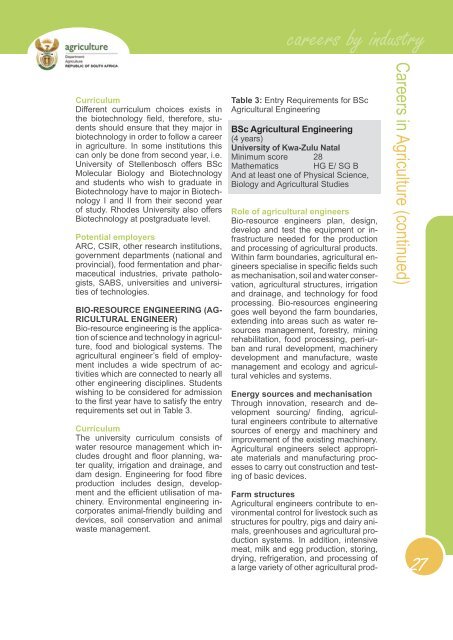CAREER - My SA Career Guide
CAREER - My SA Career Guide
CAREER - My SA Career Guide
You also want an ePaper? Increase the reach of your titles
YUMPU automatically turns print PDFs into web optimized ePapers that Google loves.
Curriculum<br />
Different curriculum choices exists in<br />
the biotechnology fi eld, therefore, students<br />
should ensure that they major in<br />
biotechnology in order to follow a career<br />
in agriculture. In some institutions this<br />
can only be done from second year, i.e.<br />
University of Stellenbosch offers BSc<br />
Molecular Biology and Biotechnology<br />
and students who wish to graduate in<br />
Biotechnology have to major in Biotechnology<br />
I and II from their second year<br />
of study. Rhodes University also offers<br />
Biotechnology at postgraduate level.<br />
Potential employers<br />
ARC, CSIR, other research institutions,<br />
government departments (national and<br />
provincial), food fermentation and pharmaceutical<br />
industries, private pathologists,<br />
<strong>SA</strong>BS, universities and universities<br />
of technologies.<br />
BIO-RESOURCE ENGINEERING (AG-<br />
RICULTURAL ENGINEER)<br />
Bio-resource engineering is the application<br />
of science and technology in agriculture,<br />
food and biological systems. The<br />
agricultural engineer’s fi eld of employment<br />
includes a wide spectrum of activities<br />
which are connected to nearly all<br />
other engineering disciplines. Students<br />
wishing to be considered for admission<br />
to the fi rst year have to satisfy the entry<br />
requirements set out in Table 3.<br />
Curriculum<br />
The university curriculum consists of<br />
water resource management which includes<br />
drought and fl oor planning, water<br />
quality, irrigation and drainage, and<br />
dam design. Engineering for food fi bre<br />
production includes design, development<br />
and the effi cient utilisation of machinery.<br />
Environmental engineering incorporates<br />
animal-friendly building and<br />
devices, soil conservation and animal<br />
waste management.<br />
careers by industry<br />
Table 3: Entry Requirements for BSc<br />
Agricultural Engineering<br />
BSc Agricultural Engineering<br />
(4 years)<br />
University of Kwa-Zulu Natal<br />
Minimum score 28<br />
Mathematics HG E/ SG B<br />
And at least one of Physical Science,<br />
Biology and Agricultural Studies<br />
Role of agricultural engineers<br />
Bio-resource engineers plan, design,<br />
develop and test the equipment or infrastructure<br />
needed for the production<br />
and processing of agricultural products.<br />
Within farm boundaries, agricultural engineers<br />
specialise in specifi c fi elds such<br />
as mechanisation, soil and water conservation,<br />
agricultural structures, irrigation<br />
and drainage, and technology for food<br />
processing. Bio-resources engineering<br />
goes well beyond the farm boundaries,<br />
extending into areas such as water resources<br />
management, forestry, mining<br />
rehabilitation, food processing, peri-urban<br />
and rural development, machinery<br />
development and manufacture, waste<br />
management and ecology and agricultural<br />
vehicles and systems.<br />
Energy sources and mechanisation<br />
Through innovation, research and development<br />
sourcing/ fi nding, agricultural<br />
engineers contribute to alternative<br />
sources of energy and machinery and<br />
improvement of the existing machinery.<br />
Agricultural engineers select appropriate<br />
materials and manufacturing processes<br />
to carry out construction and testing<br />
of basic devices.<br />
Farm structures<br />
Agricultural engineers contribute to environmental<br />
control for livestock such as<br />
structures for poultry, pigs and dairy animals,<br />
greenhouses and agricultural production<br />
systems. In addition, intensive<br />
meat, milk and egg production, storing,<br />
drying, refrigeration, and processing of<br />
a large variety of other agricultural prod-<br />
<strong>Career</strong>s in Agriculture (continued)<br />
27


